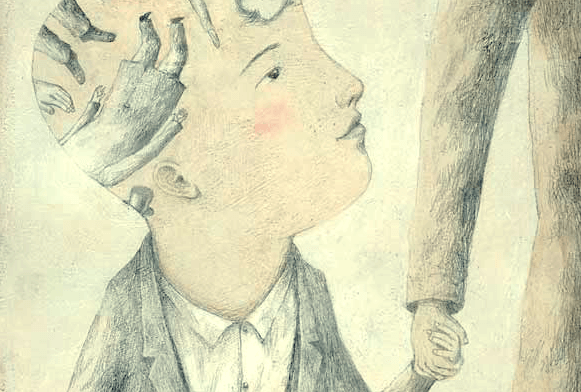When You're Trapped at an Affectionless Emotional Age

A lack of love is something that really leaves a mark, especially at certain ages. But sometimes it makes such an impact that you end up getting trapped at something called an affectionless emotional age. In other words, the lack of affection and love stops you from developing and you won’t be able to move forward until you heal.
The concept of “maturity” is basically just that: a concept. In a practical sense, we all have many different ages within us. Some of them stick out more, but the other ones are there too. That’s really lucky for us, because it helps us enjoy things with childish joy while dealing with problems with adult wisdom.
But there are also certain circumstances that can leave you at one specific age. You usually end up tied to an affectionless emotional age if you don’t do anything about the problem.
It might even have its roots during your early childhood. If that’s the case, even if you’re well-advanced in years, you might be the same emotional age as the scared, hurt child you used to be.
“Am I only writing about causes and not talking about effects? I may be writing the story of something that was missing, but that doesn’t mean it’s missing a story.”
-[Translation] Andrés Rivera-
The first affectionless emotional age
When you’re young, just about every experience will have a big impact on you. It’s the part of life when you set the foundation of who you are and who you’ll be. That doesn’t mean you don’t still have a need for affection later on, though. It just means that it’s absolutely necessary in your earliest years.
When a 1-2 year old child doesn’t get affection, the first thing they lose is their sense of trust. Children always expect their parents, or whoever takes care of them, to see to their needs.
But sometimes that doesn’t happen, or it does — but along with rejection and aggression. This will probably make it hard for the child to trust people from then on. It might even make it hard for them to trust themselves.

Lack of affection, autonomy, and independence
Around 2-3 years old, children formally start on their path towards autonomy. The biggest part of this part of this path is potty training.
At these ages, loving parents or guardians will foster autonomy with affection and without any rush. They won’t ask anything of their child that’s beyond their developmental level and learning abilities.
They also won’t slow down their child’s progress by doing things for them when they can do them on their own. Love should never lead to dependence, and autonomy should never lead to abandonment.
Children usually stay on this path to independence from between 3 to 6 years old, though there are never exact ages or dates when it comes to human beings. No matter what, though, this is always the age when they start truly exploring the world.
When a child is well-loved, they’ll go on this journey without any fear. If they’re not, they’ll probably feel uncomfortable and afraid, even if there’s nothing scary or dangerous out there.
Once they’re old enough for school, children will develop a love of work and efficiency. That is, if they have a loving support system. If they don’t, they’ll do their schoolwork with a feeling of inferiority.

The effects in adulthood
Usually you realize that you’re trapped in an affectionless emotional age when you see certain personality traits as an adult and don’t really know where they came from. You usually aren’t able to change either, even when you are convinced it’s necessary. Some traits include:
- Insecurity, timidity, fearfulness.
- Trouble reaffirming yourself, knowing what you want, and expressing how you feel.
- Difficulty setting goals and going after them because you have more fear than hope.
- Passivity in all areas of life, including your love life.
- Unable to enjoy things.
So what can you do? It’s usually possible to heal a wound caused by lack of affection. But it won’t just heal itself, either; you really have to work at it. It’s a good idea to look for ways to help that affectionless child openly express themselves. Give this inner child room to talk and say how they feel, whether you write it down or talk about it with a therapist.
Images courtesy of Ofra Amit
A lack of love is something that really leaves a mark, especially at certain ages. But sometimes it makes such an impact that you end up getting trapped at something called an affectionless emotional age. In other words, the lack of affection and love stops you from developing and you won’t be able to move forward until you heal.
The concept of “maturity” is basically just that: a concept. In a practical sense, we all have many different ages within us. Some of them stick out more, but the other ones are there too. That’s really lucky for us, because it helps us enjoy things with childish joy while dealing with problems with adult wisdom.
But there are also certain circumstances that can leave you at one specific age. You usually end up tied to an affectionless emotional age if you don’t do anything about the problem.
It might even have its roots during your early childhood. If that’s the case, even if you’re well-advanced in years, you might be the same emotional age as the scared, hurt child you used to be.
“Am I only writing about causes and not talking about effects? I may be writing the story of something that was missing, but that doesn’t mean it’s missing a story.”
-[Translation] Andrés Rivera-
The first affectionless emotional age
When you’re young, just about every experience will have a big impact on you. It’s the part of life when you set the foundation of who you are and who you’ll be. That doesn’t mean you don’t still have a need for affection later on, though. It just means that it’s absolutely necessary in your earliest years.
When a 1-2 year old child doesn’t get affection, the first thing they lose is their sense of trust. Children always expect their parents, or whoever takes care of them, to see to their needs.
But sometimes that doesn’t happen, or it does — but along with rejection and aggression. This will probably make it hard for the child to trust people from then on. It might even make it hard for them to trust themselves.

Lack of affection, autonomy, and independence
Around 2-3 years old, children formally start on their path towards autonomy. The biggest part of this part of this path is potty training.
At these ages, loving parents or guardians will foster autonomy with affection and without any rush. They won’t ask anything of their child that’s beyond their developmental level and learning abilities.
They also won’t slow down their child’s progress by doing things for them when they can do them on their own. Love should never lead to dependence, and autonomy should never lead to abandonment.
Children usually stay on this path to independence from between 3 to 6 years old, though there are never exact ages or dates when it comes to human beings. No matter what, though, this is always the age when they start truly exploring the world.
When a child is well-loved, they’ll go on this journey without any fear. If they’re not, they’ll probably feel uncomfortable and afraid, even if there’s nothing scary or dangerous out there.
Once they’re old enough for school, children will develop a love of work and efficiency. That is, if they have a loving support system. If they don’t, they’ll do their schoolwork with a feeling of inferiority.

The effects in adulthood
Usually you realize that you’re trapped in an affectionless emotional age when you see certain personality traits as an adult and don’t really know where they came from. You usually aren’t able to change either, even when you are convinced it’s necessary. Some traits include:
- Insecurity, timidity, fearfulness.
- Trouble reaffirming yourself, knowing what you want, and expressing how you feel.
- Difficulty setting goals and going after them because you have more fear than hope.
- Passivity in all areas of life, including your love life.
- Unable to enjoy things.
So what can you do? It’s usually possible to heal a wound caused by lack of affection. But it won’t just heal itself, either; you really have to work at it. It’s a good idea to look for ways to help that affectionless child openly express themselves. Give this inner child room to talk and say how they feel, whether you write it down or talk about it with a therapist.
Images courtesy of Ofra Amit
This text is provided for informational purposes only and does not replace consultation with a professional. If in doubt, consult your specialist.







